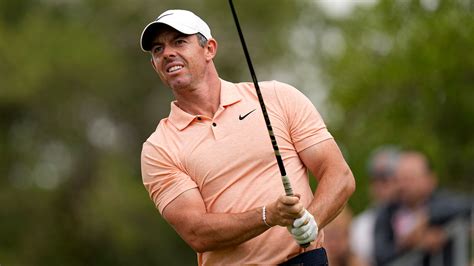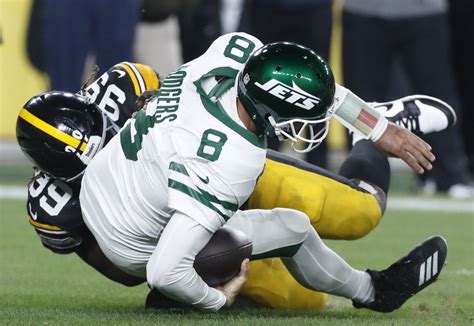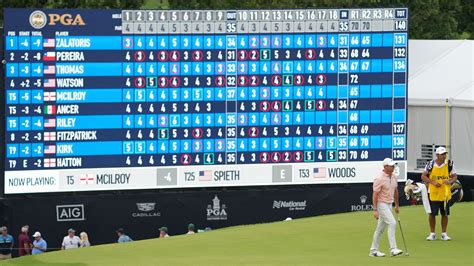
Rory McIlroy’s recent struggles on the golf course have prompted questions about his motivation and potential burnout, as the star golfer admits to searching for the necessary drive to compete at his highest level. Citing a demanding schedule and the emotional toll of high-stakes competition, McIlroy acknowledges a need to rediscover his enthusiasm for the game.
Rory McIlroy, one of golf’s most recognizable and accomplished figures, is openly grappling with a dip in motivation, sparking speculation about whether burnout is affecting his performance. In a candid admission, McIlroy has acknowledged the challenges of maintaining peak enthusiasm amidst a demanding schedule and the intense pressures of professional golf. His recent performances have fueled concerns that the relentless grind of the sport may be taking its toll.
“It’s more of a cumulative effect of everything, and that’s why I need to try to shut myself off from things and just go and enjoy myself and enjoy my life,” McIlroy stated, highlighting the multifaceted nature of his current struggles. The comments, made following a series of less-than-stellar outings, underscore the mental and emotional challenges that even the most elite athletes face.
McIlroy’s admission comes at a pivotal point in the golfing season, with major championships and significant tournaments looming. His ability to rediscover his competitive fire will be crucial in determining his success in the coming months. The golfing world is watching closely, wondering if McIlroy can reignite his passion and return to his dominant form.
The Toll of a Relentless Schedule
One of the primary factors contributing to McIlroy’s diminished motivation appears to be the relentless nature of the professional golf schedule. Top golfers like McIlroy are expected to compete in numerous tournaments throughout the year, spanning different continents and time zones. This constant travel and competition can lead to physical and mental fatigue, making it difficult to maintain peak performance consistently.
“It’s just been a lot,” McIlroy conceded, alluding to the cumulative impact of his demanding schedule. The constant pressure to perform, combined with the physical strain of travel and competition, can take a significant toll on even the most resilient athletes. The need to constantly adapt to different courses, climates, and competitive environments adds another layer of complexity.
Furthermore, the modern golf landscape is increasingly global, requiring players to participate in tournaments worldwide. While this offers opportunities to expand their brand and compete against diverse fields, it also exacerbates the challenges of maintaining a healthy work-life balance. The constant travel and time away from family and friends can contribute to feelings of isolation and burnout.
The Psychological Pressures of High-Stakes Competition
Beyond the physical demands of the sport, McIlroy also faces immense psychological pressure. As one of the most recognizable and successful golfers in the world, he is constantly under scrutiny from fans, media, and sponsors. Every swing is analyzed, every decision is dissected, and every performance is judged. This constant attention can create a sense of pressure that is difficult to manage.
The pressure to win is particularly acute in major championships, where legacies are defined and careers are cemented. McIlroy has enjoyed considerable success in major championships, winning four titles between 2011 and 2014. However, he has also experienced near misses and heartbreaking defeats, which can take a significant emotional toll.
The mental game is crucial in golf, and even the slightest doubt or hesitation can have a significant impact on performance. McIlroy has spoken openly about the challenges of maintaining a positive mindset in the face of adversity. The ability to stay focused, confident, and resilient is essential for success at the highest level.
Searching for the Spark: Rediscovering the Joy of the Game
In light of his recent struggles, McIlroy has emphasized the importance of rediscovering his enjoyment of the game. He recognizes that his motivation is intrinsically linked to his passion for golf. When he is having fun and feeling relaxed, he is more likely to perform at his best.
“I need to try to shut myself off from things and just go and enjoy myself and enjoy my life,” McIlroy said, highlighting his intention to prioritize his well-being and reconnect with the simple pleasures of the game. This may involve taking more time off, spending more time with family and friends, and focusing on activities that bring him joy outside of golf.
Many athletes have found that taking a break from competition can be beneficial in the long run. It allows them to recharge their batteries, both physically and mentally, and return to the game with renewed enthusiasm. McIlroy may consider a similar approach to revitalize his motivation and rediscover his competitive edge.
The Impact on McIlroy’s Performance
McIlroy’s dip in motivation has coincided with a period of inconsistent performance. While he has shown flashes of brilliance, he has also struggled to maintain his usual level of consistency. His driving, typically a strength, has been erratic at times, and his putting has been inconsistent.
His recent results have fallen short of his own high standards, leading to increased scrutiny and speculation. The golfing world is accustomed to seeing McIlroy contend for major championships and dominate leaderboards. When he fails to meet those expectations, it raises questions about his form and his mental state.
However, it is important to remember that golf is a notoriously unpredictable sport. Even the best players experience periods of struggle. McIlroy has the talent, experience, and mental fortitude to overcome his current challenges and return to his winning ways.
Burnout in Professional Sports: A Growing Concern
McIlroy’s situation highlights a growing concern in professional sports: the prevalence of burnout. Athletes in various disciplines are increasingly reporting feelings of exhaustion, cynicism, and a diminished sense of accomplishment. The demanding schedules, intense pressures, and constant scrutiny can take a significant toll on their physical and mental health.
Burnout is not simply a matter of feeling tired or stressed. It is a more profound condition characterized by a loss of motivation, a sense of detachment from the sport, and a decline in performance. Athletes experiencing burnout may also exhibit symptoms such as anxiety, depression, and insomnia.
Addressing burnout requires a multifaceted approach that includes managing schedules, prioritizing mental health, and fostering a supportive environment. Organizations and coaches need to be aware of the signs of burnout and take proactive steps to prevent it. Athletes themselves need to be empowered to prioritize their well-being and seek help when they need it.
The Road Ahead for McIlroy
The road ahead for McIlroy is uncertain, but he has the potential to overcome his current challenges and return to the pinnacle of the sport. His talent and experience are undeniable, and he has a strong support system in place. The key will be to prioritize his well-being, rediscover his passion for the game, and manage the pressures of professional golf.
McIlroy’s openness about his struggles is commendable. It demonstrates a willingness to address his challenges head-on and seek solutions. It also sends a positive message to other athletes who may be experiencing similar difficulties.
The golfing world will be watching closely to see how McIlroy responds to this period of adversity. His ability to regain his motivation and rediscover his competitive fire will be a testament to his character and his resilience. Whether he can rekindle the spark that once made him the most dominant player in the world remains to be seen, but his journey will undoubtedly be compelling.
Frequently Asked Questions (FAQs)
1. What is the main reason for Rory McIlroy’s current struggles?
Rory McIlroy has publicly stated that he is struggling with motivation, citing a demanding schedule and the cumulative effect of the pressures of professional golf. This has led to speculation about potential burnout.
2. What did McIlroy say about his current state of mind?
McIlroy stated, “It’s more of a cumulative effect of everything, and that’s why I need to try to shut myself off from things and just go and enjoy myself and enjoy my life.” This indicates a need to disconnect from the pressures of the sport and rediscover his enjoyment of life outside of golf.
3. How might McIlroy address his lack of motivation?
McIlroy suggested he needs to “shut himself off from things and just go and enjoy myself and enjoy my life.” This implies taking time off, focusing on personal well-being, and reconnecting with the joy of the game. Potential solutions could include adjusting his schedule, spending more time with family, and engaging in activities outside of golf.
4. What is burnout, and how does it affect athletes?
Burnout in athletes is a state of emotional, physical, and mental exhaustion caused by prolonged or excessive stress and pressure. It can lead to a loss of motivation, decreased performance, feelings of cynicism, and even mental health issues like anxiety and depression.
5. What impact is McIlroy’s lack of motivation having on his performance?
McIlroy’s dip in motivation has coincided with a period of inconsistent performance. While he has shown flashes of brilliance, he has struggled to maintain his usual level of consistency, particularly with his driving and putting. His results have fallen short of his own high standards and expectations.
Detailed Expansion of the Article:
McIlroy’s Unease: A Deep Dive into the Factors at Play
While McIlroy’s talent remains undeniable, the complex interplay of factors affecting his current state warrants a more profound exploration. It’s not merely about fatigue; it’s a multifaceted situation involving physical exhaustion, mental strain, emotional wear, and the ever-present weight of expectation.
The Grueling Reality of Tour Life:
The PGA Tour schedule is notoriously demanding. A typical season involves a near-constant cycle of travel, practice, competitive rounds, media obligations, and sponsor commitments. McIlroy, as one of the sport’s biggest stars, faces an even greater burden, with increased media attention and commercial demands. The constant shifting between time zones, adapting to different course conditions, and maintaining peak physical condition creates a relentless cycle of stress.
The impact on personal life is significant. Time spent away from family and friends can lead to feelings of isolation and loneliness, further exacerbating the mental strain. The lack of a consistent routine and the difficulty of maintaining healthy habits on the road can also contribute to physical exhaustion and burnout.
The Weight of Expectation: Pressure to Perform:
McIlroy entered the professional golf scene with immense promise, quickly establishing himself as one of the game’s brightest stars. His four major championship victories early in his career set a high bar for future success. However, with each passing year, the pressure to add to his major tally has intensified.
The media scrutiny surrounding McIlroy is constant. Every tournament performance is analyzed and dissected, with pundits and fans quick to offer opinions and criticisms. This constant attention can create a sense of pressure that is difficult to manage, particularly when results fall short of expectations.
The pressure to maintain his status as one of the world’s top golfers extends beyond major championships. McIlroy is expected to contend in every tournament he enters, adding to the cumulative stress. The fear of failure and the desire to live up to expectations can create a significant mental burden.
The Evolution of the Game: Adapting to New Challenges:
The landscape of professional golf has evolved significantly in recent years. The rise of new stars, the increasing emphasis on data analytics, and the growing importance of fitness and nutrition have created a more competitive and demanding environment. McIlroy must constantly adapt his game and his approach to stay at the forefront.
The emphasis on distance in modern golf has put a premium on power and athleticism. McIlroy, known for his prodigious driving ability, has had to work tirelessly to maintain his advantage in this area. The physical demands of generating power on the golf course can contribute to fatigue and injury.
The increasing use of data analytics has also changed the way golfers prepare for tournaments. McIlroy must analyze course statistics, track his own performance metrics, and develop strategies based on data-driven insights. This requires a significant investment of time and effort, adding to the mental strain.
The Importance of Mental Resilience: Overcoming Adversity:
Mental resilience is a critical component of success in professional golf. The ability to bounce back from setbacks, maintain a positive attitude in the face of adversity, and stay focused under pressure is essential for consistent performance.
McIlroy has demonstrated mental toughness throughout his career, overcoming challenges and setbacks to achieve significant success. However, even the most resilient athletes can experience periods of doubt and self-doubt. It is crucial for McIlroy to maintain a strong mental game and develop strategies for managing stress and pressure.
Seeking support from mental performance coaches, sports psychologists, and other professionals can be beneficial. These experts can provide guidance on techniques for managing emotions, improving focus, and building confidence.
Strategies for Rekindling Motivation:
McIlroy’s recognition of his diminished motivation is the first step towards addressing the issue. Several strategies can help him rekindle his passion for the game and regain his competitive edge.
- Prioritizing Rest and Recovery: Adequate rest and recovery are essential for both physical and mental well-being. McIlroy should prioritize sleep, nutrition, and relaxation techniques to recharge his batteries.
- Adjusting the Schedule: Reducing the number of tournaments he plays can help alleviate the pressure and reduce the risk of burnout. McIlroy should carefully evaluate his schedule and prioritize events that are most meaningful to him.
- Focusing on Enjoyment: Rediscovering the joy of playing golf is crucial. McIlroy should spend time practicing and playing without the pressure of competition, focusing on the simple pleasures of the game.
- Seeking Support: Talking to family, friends, coaches, and mental health professionals can provide valuable support and guidance. Sharing his feelings and experiences can help McIlroy process his emotions and develop coping strategies.
- Setting Realistic Goals: Setting achievable goals can help maintain motivation and build confidence. McIlroy should focus on incremental improvements rather than striving for perfection.
- Engaging in Other Interests: Pursuing hobbies and interests outside of golf can provide a healthy distraction and help maintain a sense of balance.
The Broader Context: Mental Health in Elite Sports:
McIlroy’s situation highlights the growing awareness of mental health issues in elite sports. Athletes are increasingly recognizing the importance of prioritizing their mental well-being and seeking help when they need it.
The stigma surrounding mental health is gradually diminishing, with more athletes speaking openly about their struggles. This has helped to raise awareness and encourage others to seek support.
Organizations and governing bodies are also taking steps to address mental health issues in sports. Initiatives such as mental health education programs, access to counseling services, and policies that promote athlete well-being are becoming more common.
The Impact on McIlroy’s Legacy:
McIlroy’s legacy as one of the greatest golfers of his generation is already secure. However, his ability to overcome his current challenges and add to his major championship tally will further enhance his place in history.
His journey is a reminder that even the most talented and successful athletes face challenges and setbacks. How McIlroy responds to these challenges will define his character and his legacy.
The View From The Locker Room
Other players on tour recognize the difficulties that McIlroy is facing. Many have experienced similar feelings of burnout and lack of motivation at some point in their careers. The camaraderie and support among players can be a valuable resource.
Several players have spoken publicly about the importance of maintaining a healthy work-life balance and prioritizing mental well-being. Their experiences can serve as a source of inspiration and guidance for McIlroy.
Predictions and Speculation:
Predicting the future is always difficult, but several possible scenarios could unfold for McIlroy.
- Scenario 1: Resurgence: McIlroy takes time off, addresses his motivation issues, and returns to the game with renewed enthusiasm and focus. He regains his consistent form and contends for major championships.
- Scenario 2: Continued Struggles: McIlroy continues to struggle with motivation and inconsistent performance. He experiences periods of success but fails to recapture his dominant form.
- Scenario 3: Gradual Decline: McIlroy’s motivation issues persist, leading to a gradual decline in his performance. He remains a competitive player but fails to contend for major championships.
- Scenario 4: Reinvention: McIlroy reinvents his game and his approach, adapting to the changing landscape of professional golf. He focuses on different aspects of the game and finds new ways to compete at the highest level.
Ultimately, McIlroy’s future success depends on his ability to address his current challenges and maintain his passion for the game. The golfing world will be watching closely to see how he responds.
Conclusion:
Rory McIlroy’s admission of diminished motivation highlights the multifaceted challenges faced by elite athletes. The demanding schedule, intense pressures, and constant scrutiny can take a significant toll on their physical and mental health. Addressing burnout requires a comprehensive approach that includes prioritizing rest, managing stress, seeking support, and rediscovering the joy of the sport. McIlroy’s journey is a reminder that even the most talented and successful athletes are human and that mental well-being is essential for long-term success. His ability to overcome his current challenges will not only define his future but also serve as an inspiration to other athletes facing similar struggles. The support of the golfing community and the implementation of strategies to address burnout are crucial for ensuring the well-being of athletes and the sustainability of professional sports. The coming months will be crucial in determining whether McIlroy can reignite his passion and return to his dominant form, and the golfing world will be watching with great interest. His story serves as a potent reminder that even the most accomplished individuals face internal struggles, and their willingness to address these challenges head-on is a testament to their character and resilience. The focus now shifts to McIlroy’s support system, his ability to implement effective coping mechanisms, and the broader conversation about athlete well-being within the sport. The outcome of this period could have lasting implications for McIlroy’s career and the overall understanding of mental health in professional golf.









